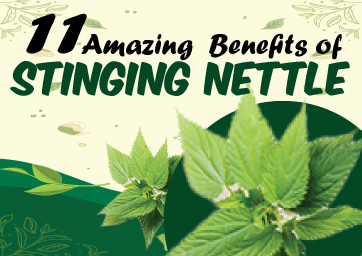Nutrition of Stinging Nettle
Different parts of the stinging nettle have different nutritional contents. Likewise-stinging nettle roots and leaves are rich sources of vitamins ranging from A, B, to C and K. Other than this, stinging leaves have essential amino acids, carotenoids, chlorophyll, fatty acids, terpenoids, minerals, and polyphenols with antioxidant properties.
If the stats of the USDA are believed, a cup of blanched nettle leaves provides 2.4 grams of protein, 6.6 grams of carbohydrates, and 37.4 calories.
11 Health Benefits of Stinging Nettle
Have a look at the astonishing health benefits of stinging nettle, which are as follows.

1. Detoxifies the Body
A wide range of valuable supplements or nutrients are found in stinging nettle, which makes it an ideal detoxifier for the body, and helps to delicately cleanse the body of toxins. As a diuretic, stinging weed can likewise guarantee that those toxins being neutralized in the body are then disposed of rapidly. It is known as another option, implying that it can further improve the nutrient uptake efficiency of the stomach and guarantee that the stomach-related processes run smoothly, preventing the aggregation of dangerous toxins. It likewise stimulates the lymphatic system, freeing up the body from the excess toxins in the kidneys.
2. Improves Circulation
The blend of high vitamin C and iron content in stinging nettle makes it ideal for stimulating the creation of red blood cells. Vitamin C improves iron uptake in the stomach, while the iron is essential to hemoglobin. By expanding the RBC count in the body, blood circulation increases wound healing speeds, and the body's limits get fundamental oxygenation to support energy levels. For a similar explanation, stinging bramble is frequently prescribed to relieve fatigue or anemia, which is described by general muscle weakness, fatigue, mental hardships, and headaches.
3. Anti-inflammatory Activity
Stinging nettle is an energizer and rubefacient substance, making it extremely successful against different inflammatory circumstances, for example, arthritis or chronic muscle pain. Research has demonstrated how stinging nettle tea or natural supplementation can treat gout, mitigate muscle pain, and lessen the side effects of arthritis.
4. Treats Respiratory Issues
Stinging nettle has likewise been associated with treating various respiratory conditions, including hay fever, asthma, and other seasonal allergies. Studies have demonstrated how specific concentrate mixes from stinging nettle can decrease allergic reactions. Normal utilization of its tea has been related to restoring asthma in Australia for ages.
5. Works on Prostate Health
Prostate enlargement and cancer are both serious elements to consider as men age, and stinging nettle has demonstrated to be a compelling method for preventing prostate development. Nonetheless, because of this treatment's chemical pathways, stinging nettle can only prevent the development, not reverse it, once the growth factor and testosterone stimulation have happened.
6. Protects Heart Health
It just appears to be legit that this astonishing cure-all herb would also be able to affect the heart. Research has showcased that regular consumption of stinging nettle tea can assist with lowering systolic blood pressure and alleviate tension and stress on the cardiovascular system.
Read Also: Heart Attack Symptoms, Causes, Treatment, Cost
7. Healthy skin
When the extracts are applied to the skin, stinging nettle has been demonstrated to diminish the seriousness of acne and can even prevent bacterial diseases. Because of its antioxidant properties can likewise speed healing, lessen the presence of scars and imperfections, and elevate anti-aging effects to diminish wrinkles and age spots.
8. Prevents Kidney Stones
Stinging nettle is known as a diuretic; however, it likewise influences the kidneys in another way. It has nephritic characteristics, implying that it can assist with breaking down stones in the kidney and gallbladder, keeping those painful conditions from worsening or requiring those stones to be either passed or carefully eliminated. Likewise, as a diuretic, stinging weed rapidly disposes of poisons, safeguarding against bladder infections and excess fluid retention.
Read Also: Ayurvedic Home Remedies For Kidney Stones
9. Helps with Pregnancy
Stinging nettle tea is frequently recommended for ladies undergoing excessively painful labor. It assists with safeguarding against excessive bleeding, as it can go about as a coagulant. Moreover, it will assist with simulating milk production and make lactation easier.
10. Promotes Feminine Health
Stinging nettle has various dynamic parts that influence feminine health. For painful premenstrual symptoms, it can soothe cramps and bloats while limiting the bloodstream during the feminine cycle because of its astringent capacities. For ladies going through menopause, stinging nettle can smooth the progress and act as a remedy, so the hormonal shift won't be dramatic in the body.
11. Osteoporosis and Bone Health
Even though we don't hear a lot about boron, it is as yet a significant mineral found in stinging nettle. Boron has been scientifically connected to keeping up with calcium content in our bones, and that implies that stinging nettle can assist with easing back the beginning of osteoporosis. When you blend that effect with the hormone-regulating impact that stinging nettle has, which assists with controlling and screening bone health, it seems like this herb genuinely can do everything.

Types of Stinging Nettle
Stinging nettle or Urtica dioica (scientific name) is a herbaceous plant that grows in the damp, fertile soil of the United States, Canada, and Europe.
In the Urtica family, many plants are referred to as stinging nettle. Here we are mentioning the four different types of stinging nettle, which are as follows.
• Urtica afghanica: This type of stinging nettle plant is majorly found in central and southwestern Asia, with or without stinging hairs.
• Urtica galeopsifolia: This stinging nettle plant has no stinging hairs. Therefore, it is sometimes referred to as stinging nettle.
• Urtica gansuensis: This type of nettle plant has stinging hair and is found in eastern Asia.
• Urtica gracilis: This stinging nettle is sometimes called the American stinging nettle.
So there are different types of stinging nettle plants with different names and native land.
Way to Use Stinging Nettle
After knowing different aspects of stinging nettle, you must consider how it can be used. Therefore, to help you out, we are shedding light on stinging nettle uses that vary based on their intended use.
Some use it as stinging nettle tea and brew its leaves.
Stinging nettle extract is used in the form of capsules, tablets, and cream.
Moisten nettle leaves are used as a natural topical solution to apply to the skin.
However, one thing that should keep in mind with stinging nettle uses is that the Food and Drug Administration (FDA) does not regulate the ingredients, strengths, and claims of herbal remedies or supplements of stinging nettle products as it does with labeled drugs.
Therefore, before using stinging nettle products, always prefer to consult with your doctor first.
Stinging Nettle Side Effects on Health
Stinging nettle is typically considered safe to consume. Still, it would be best to consult with your doctor first as there are possible side effects.
Hives or rashes, if nettle leaves are not handled with care
Stomach problems
Diarrhea
Sweating
Urinary issues to patients with kidney and bladder problems
Besides, women with pregnancy should use stinging nettle, whether its root or leaves, for safety because it can cause uterine contractions in ladies with pregnancy, so it is advised to consult with the healthcare provider before using this herb during pregnancy.
Stringing Nettle Uses with Other Drugs
It can be used with different sorts of medicines like
Conclusion
Going through the blog, you may have known about several health benefits of stinging nettle, along with its different aspects. However, the use of stinging nettle is considered safe, though it may cause some side effects. Therefore, it is always better to consult first with your family doctor before using stinging nettle as it may interact with other medications.



 Contact Us
Contact Us






 Hospitals
Hospitals
 Doctors
Doctors
 Diagnostic
Diagnostic
 Pharmacy
Pharmacy
 Health Tips
Health Tips
 Blog
Blog



















Comments